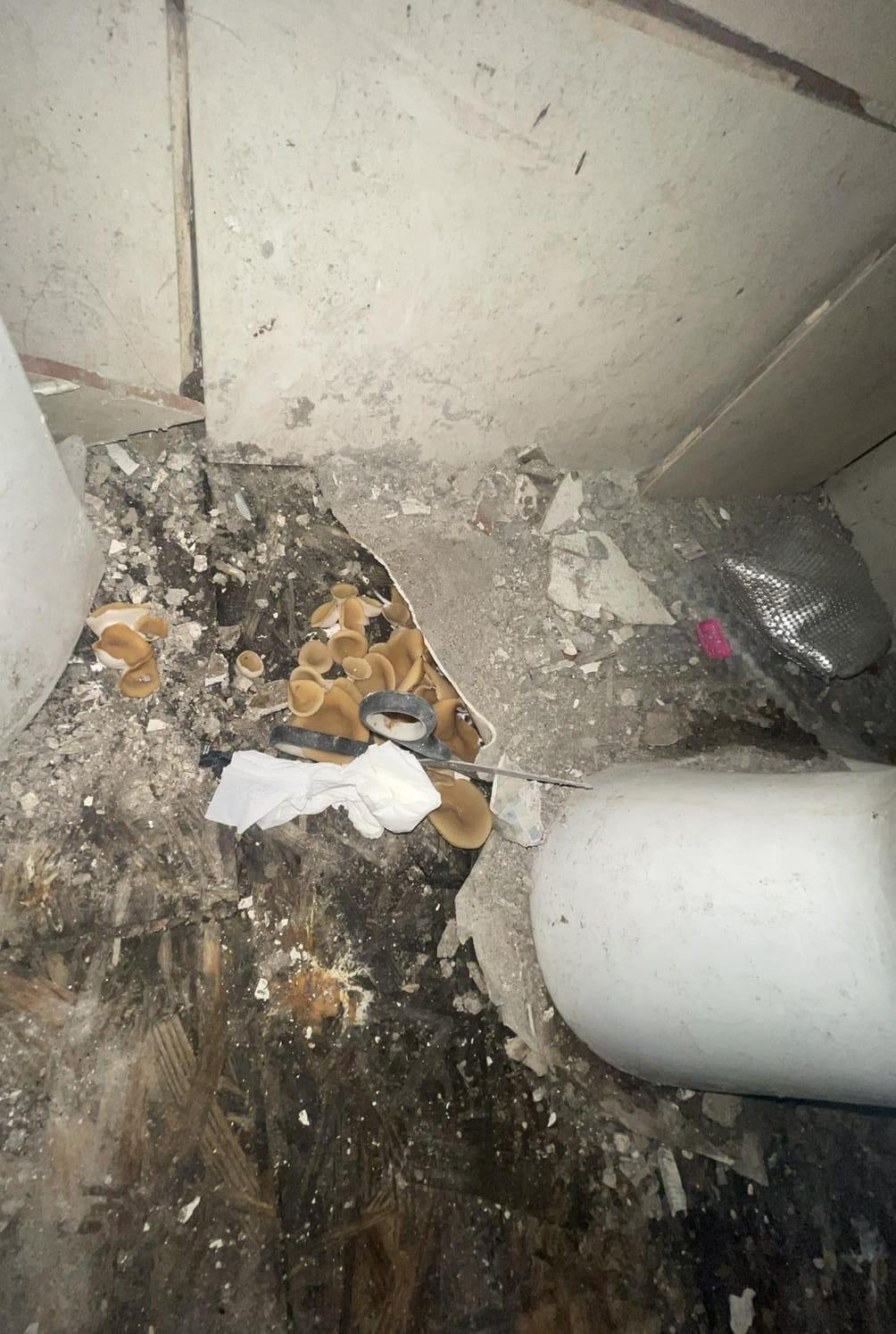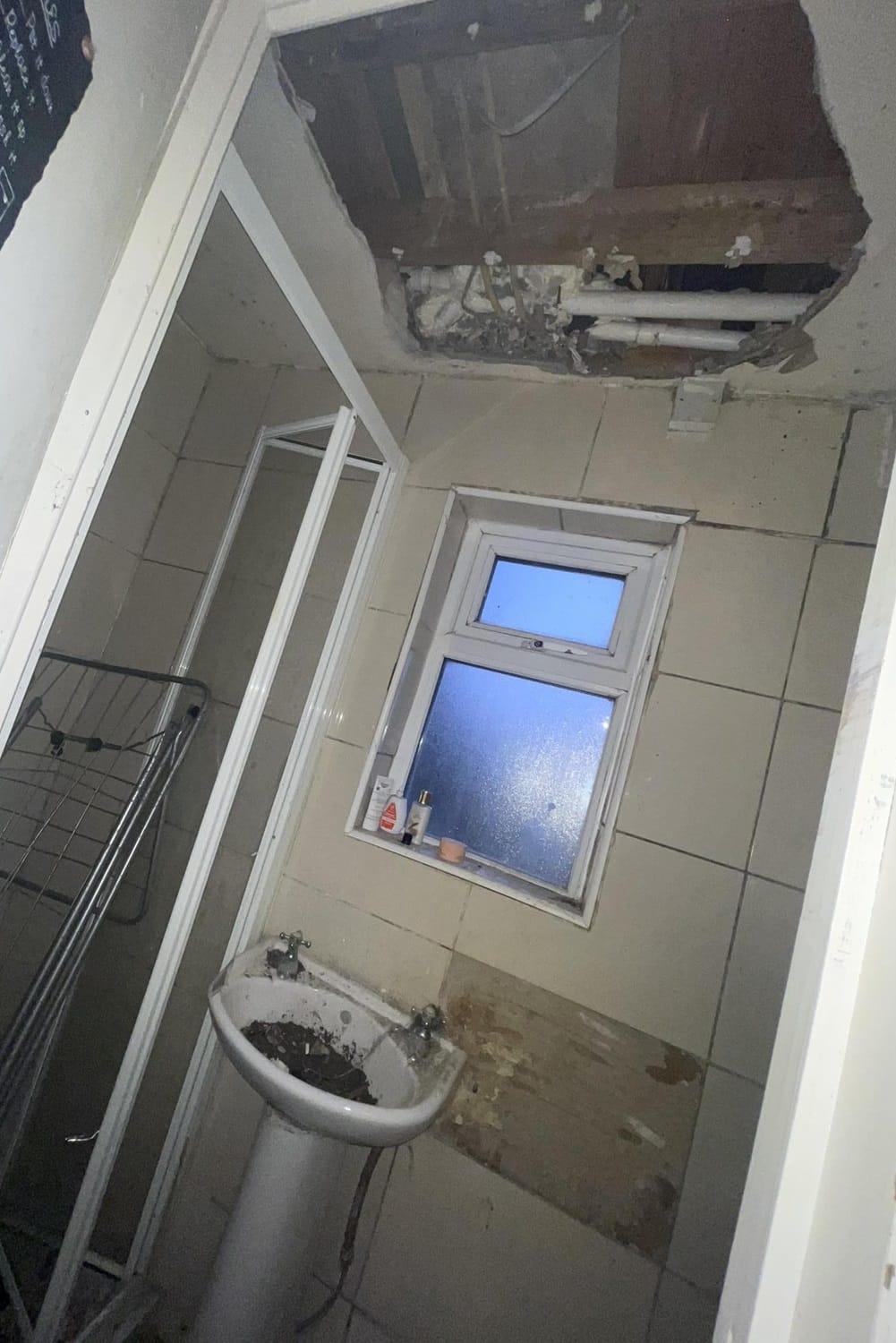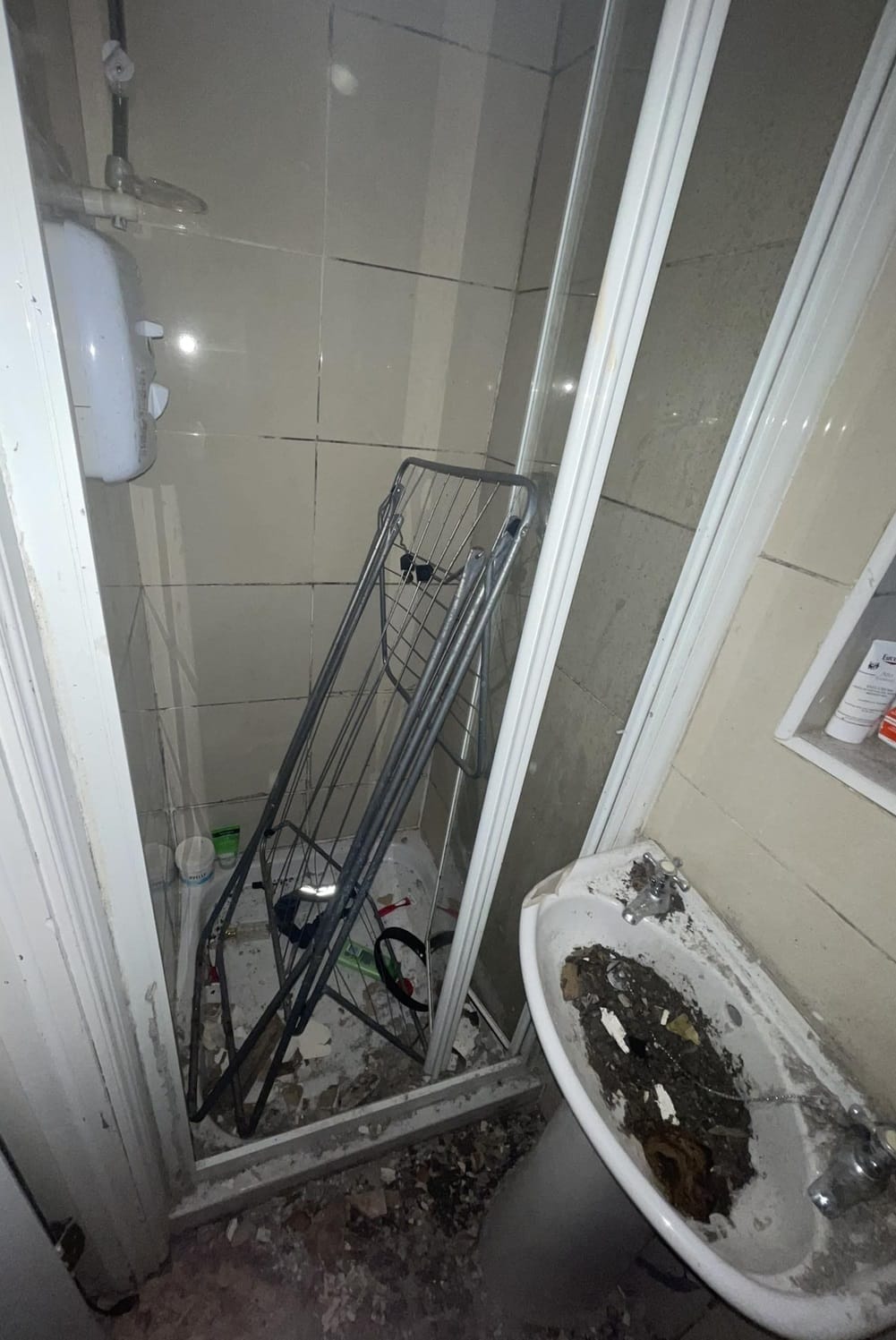What’s the best way to tell area residents about plans for a new asylum shelter nearby?
The government should tell communities directly about plans for new asylum shelters, some activists and politicians say.
Ciara Hill has lived without a working shower or toilet, with mould and a broken front door, and a lingering dread that she will end up back where she was a few years ago – homeless again.

“I do hear this music in my dreams,” said Ciara Hill on 5 October last year. She was on hold to the Residential Tenancies Board – again. Her 20th call at least since 3 August, her phone records showed.
Hill was sitting on her bed in her small studio flat in Rathmines, her brown hair scooped up in a bun, wearing a black puffer jacket over a blue Adidas jumper.
The room was cold. There was black mould on the walls and the air smelt musty, though the window was pushed open. In the bathroom, the sink was broken, and the shower was missing a showerhead.
In June 2022, Dublin City Council issued the landlord, Mel Kilraine, with a prohibition notice for the flat, one of a bunch of apartments in an old Georgian terrace in the heart of Rathmines village.
Issuing a prohibition notice comes at the end of a long process during which environmental health officers alert a landlord to ways in which an apartment isn’t up to code, and first give them chances to fix it. Sitting tenants don’t have to move but landlords can’t re-let until they make it decent.
The council later lifted that prohibition notice, a letter shows.
While Hill was seeking help from the council, she was also trying to file a dispute with the Residential Tenancies Board (RTB), the rental regulator – the other route for tenants or landlords to try to push for their rights through hearings and rulings.
After 20 minutes on hold, the phone call cut out. Hill rang back again and a staff member tried to search for her dispute. Hill had filled it out online and in hardcopy, she told them.
The staff member finds emails from August, but no dispute on the file. Hill asks to speak to a supervisor and is told that someone will call her back. They won’t, she says. All the calls on her call log are outgoing.
Hill says it’s the same story every time she calls the RTB. Some staff mentioned a backlog in processing disputes, so they weren’t able to tell her if the online form had been received.
Hill has learning difficulties and problems with her hearing. She had a special needs assistant throughout school. She knows she needs someone to sit down with her and go through everything properly, but she can’t seem to find the support she needs.
“I really need a keyworker,” she said.
Fast forward to 4 November and Hill sends a video showing that the ceiling of her bathroom has collapsed. Slabs of ceiling and dust cover the floor.
With nowhere else to go, she stayed in the flat. But she had to ask her neighbours every time she wants to go to the toilet, she says. “It’s highly embarrassing,” said Hill, on the phone on 12 January.
To her, it seems neither the RTB nor the council consider her case urgent, she says. And that’s surprising, says Hill.
Hill messaged the environmental health officer from Dublin City Council on 4 November, about the collapsed ceiling. That kicked off the process again of notices and wait periods.
Over the phone on 22 November, Hill finally got a case number from the RTB relating, among other things, to her claim of substandard accommodation, she says. But she still doesn’t have a hearing date.
A spokesperson for Dublin City Council didn’t respond to queries about the property, including whether the process lacks the necessary sanctions to force landlords to keep up standards.
A spokesperson for the RTB said it cannot comment on individual cases but that landlords can be prosecuted for failing to maintain rental standards.
The landlord, Mel Kilraine, didn’t respond to queries sent by email and text about the council’s findings that the home breached minimum standards, and whether he planned to carry out the works.
But last week, almost three months after the part of the ceiling fell down, workmen arrived at the apartment, Hill said, and began to fix it up and also to paint over the mould on the walls.
The Department of Housing has a target that councils inspect a quarter of all rental properties in their area each year, but for Hill, inspections haven’t led to timely improvements in how she lives. Neither has the existence of the RTB, the regulator for the rental sector, which is meant to keep up standards.
Instead, Hill has been cut off by the council from her housing subsidy and lived for months with no working shower or toilet, mould, a broken front door, and lives still with a lingering dread that after all of the bureaucracy and calls and stress, she will end up back where she was a few years ago – homeless again.
Hill became homeless when she was 21 years old, she says. She spent three years bouncing around homeless services, staying in shared dorms.
When she got the small flat in Rathmines, she was delighted, she says. Ponying up the money to secure it had been hard, given she was under 25 years old, and so on the reduced social welfare payment.
She thinks the dampness has aggravated her asthma and chest infections, she says, but it has been better than homeless accommodation, where at times she feared for her safety sleeping in shared bedrooms.
Sometime in 2022 – Hill can’t remember exactly when – Dublin City Council’s environmental health officer came to inspect her flat.
When a council worker finds ways in which a rental isn’t up to standard, they first issue an improvement letter outlining what needs to be fixed, then – if a landlord ignores it – an improvement notice.
If nothing still happens, they can issue a prohibition notice. The council sent out its first prohibition notice in June 2022.
The landlord did some work on the place after that, says Hill. He fitted an extractor fan and laid new laminate floors, for example, she said.
Then, Dublin City Council lifted the notice, she says. Hill was relieved at the time, she says. Sure, the dampness was still a big problem, she says, but she didn’t want to risk being kicked back to where she had been.
“I don’t think I could mentally withstand more years in homeless accommodation,” she says.
Environmental officers from the council again inspected the flat in August 2023. And, the process to bring the flat up to adequate conditions kicked off again. They issued an improvement notice flagging 24 items to sort.
Among them, fire-safety issues, mould, a broken sink, uneven flooring, issues with the heating, the lack of a shower head, and a leaking toilet wastewater pipe.
Then, on 4 November, the bathroom ceiling collapsed. Hill sent a video to the environmental health officer.
Council staff came out again to inspect the property on 8 November, messages show. But Hill wasn’t home.



Each of the steps that the council takes to push a landlord to bring a renter’s home up to basic standards involves a waiting period. A landlord has 35 days to comply with an improvement notice, for example, before the council checks whether work has been done.
So, when Hill asked for an update in December, pointing to her bathroom still being in the same state, they told her they had to wait until the improvement notice period had expired.
By 20 January, Dublin City Council had issued a new prohibition notice for 190 Lower Rathmines Road. But that one isn’t for Hill’s apartment.
A spokesperson for the council said on Monday that, “In this instance, a prohibition notice has been served in respect of the common areas” within the building.
Councils do have some powers beyond inspections and ramping up notices, to force basic standards in the private-rental sector. They can issue legal proceedings, but Department of Housing data shows that is rare.
Hill says that one of the things she finds the most difficult is trying to deal with the RTB. She can’t get straight answers, she says, because they rarely reply to her emails beyond the automated initial response.
Instead, she has to phone them, again and again and again. Different staff say different things, said Hill.
Recently RTB staff told her on the phone that they don’t know if they have jurisdiction in her case, she says. A different staff member told her that her case was considered urgent, says Hill.
Hill was on the phone to the RTB for 30 minutes on 9 August and told them all about her dispute in detail, she says.
After that, she repeatedly filled out dispute forms online and hard copies, she says.
On 20 September, she wrote to the RTB to say that she had filled in three separate disputes and asked if these were lost. She had sent that to an incorrect email address, but didn’t realise.
She continued to call the RTB numerous times, she says. Finally, on 22 November, nearly four months after she first tried to file a dispute, she got a case reference number.
On 4 January, the RTB still hadn’t assessed her dispute. Two weeks later on 18 January, Hill got confirmation that she could proceed with a dispute in relation to alleged breach of landlord obligations and standard and maintenance of dwelling.
She still doesn’t have a date for a hearing, says Hill.
In October, a spokesperson for the RTB said that the average wait time for a case number to be assigned is 14.3 calendar days from receipt of application.
At the RTB, adjudicators only have the powers to issue fines to a landlord for substandard conditions, not force them to change anything or renovate.
In November 2022, the RTB flagged in a report to the Department of Housing that it can only accept written dispute applications online or by post. It asked the department to give it powers to register disputes related to illegal evictions over the phone – but that is yet to happen.
The Department of Housing didn’t respond to queries as to whether the RTB process should change so that staff there can register any dispute over the phone. The department referred that query to the RTB.
Hill moved into the property in May 2021. She paid her rent to Dublin City Council each week – it was taken directly out of her social welfare payment, she says.
In or around August 2023 – Hill isn’t sure, because she wasn’t told at the time, she says – Dublin City Council stopped taking her council rent and stopped paying the housing assistance payment (HAP) to the landlord, she says.
That means she has fallen into arrears.
Kilraine issued a warning to Hill in September 2023 for non-payment of rent. He has since issued a notice of termination – an eviction notice – on the grounds of rent arrears, she says.
Hill phoned the council to ask why they stopped paying the rent, but she isn’t certain still, she says, as she has been told different things on different occasions.
Dublin City Council hasn’t responded to a query as to whether it cut off the subsidy because of conditions in the property or for another reason.
Hill had reported the leak in the ceiling to the council’s environmental health inspector, she says, before it collapsed. When it did, and he came to look, he said it was her choice whether to remain there, she says.
In the weeks before any workmen showed up, Hill said it was hard to decide which was worse, living without a bathroom or living in shared dorms in homeless accommodation where other people are using drugs.
“It’s taking a toll on my mental and physical health,” said Hill by phone on 13 January. “I’m living on my nerves.”
[CORRECTION: This article was updated at 2.30pm on 11 April to delete a reference to council powers to repair properties and bill landlords, as this provision is no longer in the law. Sincere apologies for the error.]
Get our latest headlines in one of them, and recommendations for things to do in Dublin in the other.